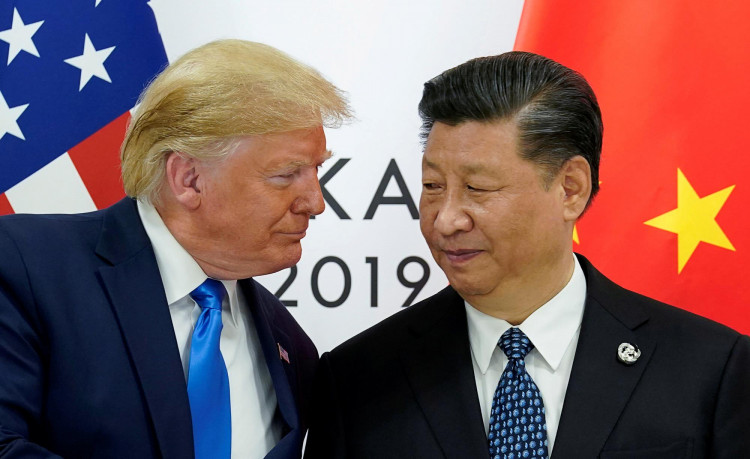Chinese President Xi Jinping declared that his country is "not afraid" of U.S. pressure, as Beijing announced a sweeping 125% tariff on U.S. imports Friday, intensifying the economic standoff with the Trump administration. The move comes days after President Donald Trump raised tariffs on Chinese goods to 145%, while temporarily pausing duties on other countries.
"There are no winners in a trade war, and going against the world will only lead to self-isolation," Xi told Spanish Prime Minister Pedro Sánchez during a meeting in Beijing, according to Chinese state broadcaster CCTV. "For over 70 years, China's development has relied on self-reliance and hard work - never on handouts from others, and it is not afraid of any unjust suppression."
Xi's public statement was his first on the trade war since the most recent tariff escalation. Shortly after his remarks, China's Finance Ministry said in a statement: "The U.S. escalation of tariffs on China is a mistake on top of a mistake, which seriously infringes on China's legitimate rights and interests and seriously undermines the rules-based multilateral trading system."
A spokesperson for China's Commerce Ministry said Friday that the "successive imposition of excessively high tariffs on China by the U.S. has become nothing more than a numbers game, with no real economic significance." The spokesperson added, "It merely further exposes the U.S. practice of weaponizing tariffs as a tool of bullying and coercion, turning itself into a joke."
Beijing announced the new tariffs as part of a broader strategy to demonstrate economic resilience and shore up international alliances. In a thinly veiled criticism of U.S. unilateralism, Xi told Sánchez, "China and the EU should fulfill their international responsibilities, jointly uphold the trend of economic globalization and the global trade environment, and work together to oppose unilateral bullying."
The latest levies effectively bring trade between the two largest economies to a near standstill. Average U.S. tariffs on Chinese exports now exceed 135%, while Chinese duties on U.S. goods have climbed from 84% to 125%. Beijing indicated it would not continue raising tariffs, but warned it retains other options.
"If the U.S. persists in substantively harming China's interests, China will resolutely take countermeasures and fight to the end," the Commerce Ministry said. Among the retaliatory tools reportedly under consideration are restrictions on U.S. poultry, limits on services like legal consultancies, and tighter scrutiny of U.S. intellectual property earnings in China.
China has also begun reducing U.S. cultural imports. "The wrong action of the U.S. government to abuse tariffs on China will inevitably further reduce the domestic audience's favorability toward American films," the China Film Administration said. "We will follow the market rules, respect the audience's choice, and moderately reduce the number of American films imported."
Instead of seeking a direct dialogue with President Trump, Xi is pivoting to diplomacy elsewhere. He is expected to begin a high-stakes Southeast Asia tour next week, visiting Vietnam, Malaysia, and Cambodia - nations previously targeted by Trump's tariffs but now seen by Beijing as strategic partners.
"The more complex and volatile the international landscape becomes, the more important it is to maintain sound and stable relations," Xi told Sánchez, signaling China's intent to strengthen bilateral ties with European and regional allies amid deepening tensions with the U.S.
CNN reported that Trump is waiting for Xi to initiate a leader-level call, while Chinese officials have repeatedly declined to make such overtures. China instead appears focused on portraying itself as a defender of global trade norms and a counterweight to what it calls "unilateral coercion" from Washington.
Trump defended his latest move on Truth Social, stating: "Based on the lack of respect that China has shown to the World's Markets, I am hereby raising the Tariff charged to China by the United States of America to 125%, effective immediately. At some point, hopefully in the near future, China will realize that the days of ripping off the U.S.A., and other Countries, is no longer sustainable or acceptable."






